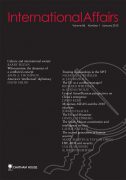Co-authored with Richard G. Whitman and subsequently published in International Affairs, this article offers an analysis of the EU’s engagement in Georgia as a standpoint from which to assess the EU’s role as a conflict manager. The paper begins with a brief narrative account of the development of EU-Georgia relations in the context of the country’s two unresolved conflicts over Abkhazia and South Ossetia. It then proceeds to the analysis of two sets of factors — those within, and those external to, the EU — that are crucial for understanding the nature and impact of EU efforts to manage the two Georgian conflicts.
On the basis of this case-study analysis, a wider analysis is offered of the EU’s potential for assuming a wider role as an international security actor. This is undertaken by considering both the limitations of the EU’s existing capabilities for conflict resolution and the new developments contained within the Lisbon Treaty. The final part of the paper asserts that the EU has suffered from two key weaknesses that have prevented it from living up to its aspirations of becoming a globally significant and effective conflict manager. The first is structural, namely the lack of, to date, a permanent External Action Service; the second is conceptual, namely the lack of a coherent and comprehensive conflict management strategy. The article concludes with five substantive principles that should guide the EU’s approach to conflict management.

